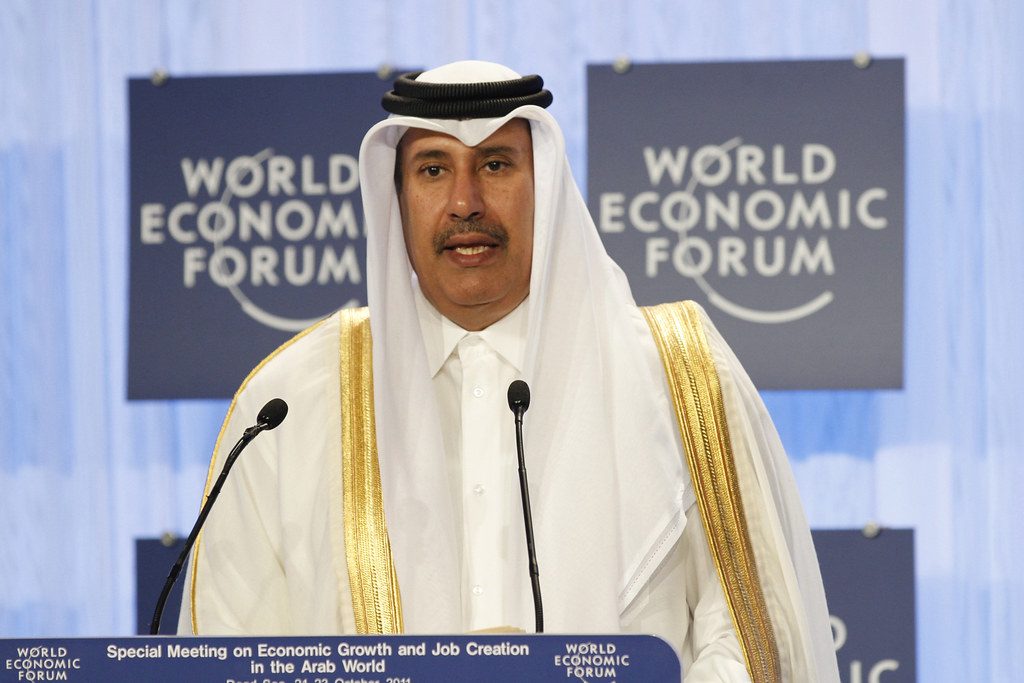A former Qatari official suggested the alleged attempt to overthrow the current Jordanian king was linked to the monarch’s “stance” on the Abraham Accords.
Qatar’s former Prime Minister Sheikh Hamad bin Jassim Al Thani, known as HBJ, took to Twitter to comment on the latest political developments in Jordan, describing the alleged coup against King Abdullah II bin Al Hussein as a premeditated move by “the previous US administration and one of the countries in the region”.
Although he fell short of naming the country involved, HBJ linked the events to King Abdullah’s “rejection” of the Abraham Accords, which saw a number of Gulf and Arab states normalise relations with Israel.
“The main reason behind this failed attempt was King Abdullah’s stance against normalisation at the expense of the Palestinian cause, or what has come to be called the Abraham Accords. That position was an obstacle to those plans,” HBJ tweeted in a thread, adding that Jordan’s stability is important to the Gulf Cooperation Council.
ما حصل مؤخراً في المملكة الأردنية الهاشمية الشقيقة كان يخطط له منذ فترة طويلة من بعض مسؤولين الإدارة الأميركية السابقة وإحدى دول المنطقة بهدف استبدال النظام الحالي في الأردن بقيادة الملك عبد الله الثاني.
— حمد بن جاسم بن جبر (@hamadjjalthani) April 11, 2021
The remarks were met with backlash from several Twitter users who in turn accused Qatar of being the alleged country behind the events in the Hashemite kingdom.
The online debate prompted a response from editor-in-chief of Qatar-based Al Arab newspaper, Abdullah Al-Athba, who quickly intervened in what he said was backlash from Saudi “electronic flies” or Twitter bots.
Al-Athba also said “conspiracies” against the Jordanian monarch have emerged since 2014 when he expressed Amman’s refusal to compromise its position with the Palestinian case in exchange for foreign aid.
Read also: Qatar’s Amir in solidarity call with Jordan king after foiling of alleged ‘coup’
Since details of the alleged coup attempt first surfaced, analysts and diplomats have attempted to decipher the news, with many questioning the arrest of King Abdullah’s half-brother and former crown prince, Prince Hamzah bin Al Hussein, who was accused of being involved in plots to destabilise the country.
Jordanian press agency [PETRA] said he was merely questioned but the prince himself confirmed in a video to the BBC that he was placed under house arrest.
The issue is now believed to have been solved between the Jordanian royals, though analysts have continued to question whether foreign interference played a role in the schism.
Analysing the plot, the Arab Center for Research and Policy Studies said that news of foreign involvement appears to be nothing more than “political propaganda”.
The role of Bassem Awadallah, the former head of the royal court and envoy to Saudi Arabia, who was also arrested as part of the sweep, remains unclear, the Doha-based centre said.
If there is proof of connection between Awadallah and Prince Hamzah’s involvement in the events, it would hinder his credibility among Jordanians, the centre added.
Qatar’s support for King Abdullah
Israeli journalist Edy Cohen also attempted to analyse the situation, though he accused Qatar of being the country behind the latest events in Jordan.
Responding to his accusations, retired Jordanian Colonel Muhammad Alaeddin denied Qatar’s involvement, saying,” Take it from me. Qatar has no role in what happened at all…you are already one of the causes of the discord that you planted among us.”
Qatar, which shares strong bilateral ties with Jordan, was one of the first to hold a phone call with King Abdullah to express Doha’s solidarity with the kingdom.
Sheikh Tamim expressed Qatar’s support and solidarity with Jordan in all decisions and measures taken by King Abdullah to preserve Amman’s security and stability.
Doha also “stressed that the developed strategic relations between the two brotherly countries will remain an honest and strong guard against any attempts to undermine security and stability in the two countries and the region,” a later statement released by QNA said.
Awadallah was among a number of others, including member of Jordan’s royal family, Sharif Hassan bin Zaid, were arrested on April 3rd for allegedly hindering the country’s stability.
Jordan has announced that a public investigation is underway and details of the probe will be revealed “in a transparent and clear form”
“No one is above the law and Jordan’s security and stability are above all,” Jordanian army chief, Yousef Huneiti said. told PETRA.
Follow Doha News on Twitter, Instagram, Facebook and Youtube







